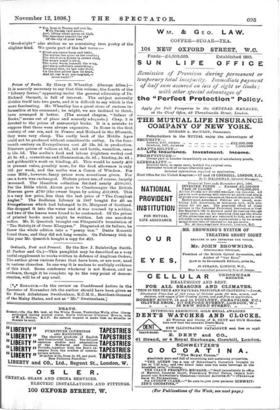Prices of Books. By Henry B. Wheatley. (George Allen.)— It
is scarcely necessary to say that this volume, the fourth of the "Library Series," appearing under the general editorship of Dr. Richard Garnett, is full of interest. The subject naturally divides itself into two parts, and it is difficult to say which is the more fascinating. Mr. Wheatley has a great store of curious in- formation at his command ; he might, we are inclined to think, have arranged it better. (The second chapter, "Sellers of Books," seems out of place and scarcely adequate.) Chap. 3 is devoted to the prices of manuscript books. It is a mistake to suppose that these were always expensive. In Rome in the first century of our era, and in France and Holland in the fifteenth, they were very cheap. The costly book of the Middle Ages could nct be produced without considerable outlay. In the four- teenth century an Evangeliarum cost .C3 15s. 3d. in production. Nineteen quires of vellum at 8d., ink and bottle, vermilion, came to 15s. 5d. The scribe's food and labour (eighteen weeks) cost .t1 8s. 4d.; corrections and illumination, 68.4d.; binding, 3s. 4d.; and goldsmith's work on binding, £1. This would be nearly .Q50 in present value, possibly more, for the food allowance is only 10d. per week, and the scribe was a Canon of Windsor. For some MSS., however, fancy prices were sometimes given. For one a town was exchanged. Modern prices are, of course, largely increased. The Hamilton collection fetched nearly .t100,000. For the Bible which Alcuin gave to Charlemagne the British Museum gave ..8750 (the owner began by asking £12,000). This is a very low price, less than the last price of "The Compleat Angler." The Bodleian Library in 1887 bought for £6 an Evangeliarnm which had belonged to St. Margaret of Scotland. She dropped it into the water and it was rescued by a soldier, and two of the leaves were found to be contracted. Of the prices of printed books much might be written. Let one anecdote suffice. Mr. B. Quaritch brought out Fitzgerald's translation of " The Rubilyit of Omar Khayyam." Disgusted at its failure, he threw the whole edition into a "penny box." Dante Rossetti found them, and they did not long remain. On February 10th in this year Mr. Quaritch bought a copy for £21.






































 Previous page
Previous page